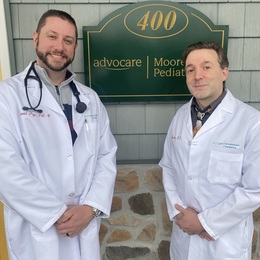
The No. 1 priority for parents is ensuring the well-being and proper development of their children, which is why Advocare Moorestown Pediatrics provides a comprehensive approach to the utmost compassionate care for which their team is known. By incorporating the latest pediatric research with authentic, situational knowledge of how modern children experience the world, Dr. John Giardino has centered his practice upon providing families with multidisciplinary analyses and solutions.
Lisa A. Tighue, MSN, RN, APN, CPNP, PMHS and David Fry, PA-C, MBA, MBS, each specialize in different aspects of pediatric care to combine psychological and biological care designed to improve each child’s health and happiness.
Tighue graduated from Mercer Medical School of Nursing and Thomas Jefferson University, and recently went back to school for her pediatric mental health certification at Duke University. She has since implemented a behavioral health unit at Advocare Moorestown Pediatrics.
“I'm so glad that I could bring that into the primary care world, because I get the privilege of watching these kids grow up, and I know their family, I know their dynamics and what’s going on in their house… and I can bring that into their treatment plan,” affirms Tighue.
Fry began his career in emergency services and worked as a firefighter. After receiving master’s degrees in biomedical science and business administration from Rowan University and medical training at Philadelphia College of Osteopathic Medicine, he works with both Advocare Moorestown Pediatrics and Cooper Health to provide the best possible treatment plan for each patient regardless of their financial or insurance situations.
“I can pick up my phone at any point and say, ‘you need this specialist urgently’ to make sure that the continuation of care to the next level is aided with them. …I have specialists’ personal phone numbers because we want [patients to have] access to care,” affirms Fry.
Tighue and Fry’s teamwork is exemplified through their work with patients with head injuries. Fry specializes in concussion management—most commonly following a sports injury. As research has expanded to a degree in which impact injuries have been determined to be at risk of causing cognitive and behavioral impairments, treatment plans are multifactorial.
Beyond their continuous medical training in a more technical scope, Tighue and Fry recognize the large role that social and cultural factors have upon children’s health—especially because physical symptoms can lead to behavioral symptoms and vise-versa. Children today are growing up in a time with unlimited access to information and unprecedented connectivity. While the internet and social media can perhaps be tools to increase education and socialization, excessive screen time has proven over the last two decades to produce more harm than good.
Both care providers have witnessed a significant uptick in eating disorders, anxiety, depression, self-harm and ADHD diagnoses—in part due to the pandemic, and more significantly due to unlimited screen time. Tighue shares that patients will report up to 10 hours a day gaming and/or online. Playing video games to that extent can compromise physical responses such as dry eyes and increased fatigue, but they can also compromise a child’s ability to pay attention, stay focused, or even to separate reality from virtual worlds.
Similar in its ability to distort reality, Tighue says social media not only glamorizes self-harm and eating disorders, but can show kids how to hide the signs from their parents and doctors. However, she and Fry are adept at identifying unspoken complexities.
“Neurodivergency goes hand in hand with anxiety because of the expectations. The expectations on these kids are really high,” says Tighue. “Self-harm is a biggie, and unfortunately, they can hide it, so you really have to take the time to do daily check-ins. Family meals sometimes aren't happening, so those daily check-ins are so important.”
She stresses that children and teens need to be guided into conversations or may otherwise give one-word responses.
“Family structure is present at the dinner table,” Fry adds. “At least in my household, that is when those questions are asked of my two children: What activities you did at school, what made you happy, what made you sad? What could you have done differently about the one that made you sad? Would you like to do more about the ones that made you happy? So that, structured that way, is to convey that conversation will come back to you.”
From the moment families walk through the door, Tighue and Fry want them to know that they are in a safe, judgement-free environment. They will confer with multiple disciplines and practices to get the answers needed, and they will adapt their interactions with each child to their individual experiences, expectations and comfortability.
“If they need something from any resource that is at our disposal, they are free to ask at any point,” says Fry. Tighue continues: “We really will help navigate their external environment. We'll go above and beyond.”
Advocare Moorestown Pediatrics
Moorestown
(856) 235-0264
AdvocareMoorestownPeds.com












